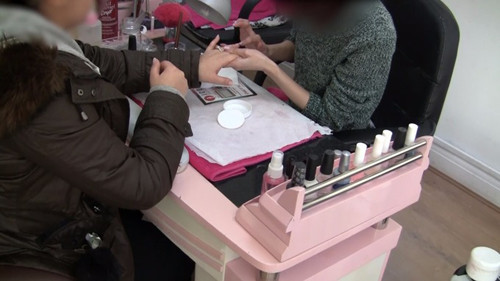UK warns of Vietnamese slavery in nail salons
Many illegal Vietnamese immigrants in the UK are being exploited like slaves in nail salons.
 |
A nail salon in Bath, Somerset, southwest England, was closed in March after the owner was accused of conspiring to control workers for the purpose of exploitation. Photo: ITV. |
Independent anti-trafficking groups have called on the British government to tighten controls on nail salons to prevent illegal migrant workers, many of them Vietnamese, from being exploited as slaves, the Guardian reported.
A report published on 11 September by Kevin Hyland, an independent commissioner working to combat modern slavery, paints a detailed picture of the situation of Vietnamese workers trying to enter the UK illegally, highlighting the increasing number of Vietnamese being exploited in nail bars and cannabis farms across the UK. The report even provides evidence that some have been kidnapped into the UK.
Although there are no exact statistics, Vietnam is consistently the leading or second-leading country in terms of the number of illegal migrant workers, more than half of whom are underage children, according to anti-trafficking police.
Over the past 10 years, the Vietnamese community in Britain has become “particularly known in the nail salon sector”, according to Commissioner Hyland, who was appointed by Prime Minister Theresa May as the government’s first adviser on human trafficking issues.
According to Mr. Hyland, most nail salons only accept cash transactions and payments, which makes it difficult for authorities to manage.
“This is a serious and organized crime. Human beings are being bought and sold as commodities,” Hyland wrote in the report. “We see a consistent link between nail salons and illegal immigration. We know there are people who are nurturing and funding this organized crime.”
Nail salon workers work six days a week for at least eight hours a day. They often live in cramped quarters set up by their employers. Most nail salon workers are minors.
"One victim was forced to work seven days a week from morning until 6am or 7pm for a salary of £30 (nearly $40) a week," police said.
Another victim, an orphan from Vietnam, was tricked into coming to the UK by traffickers. After arriving in the UK, the boy was locked in a room to learn how to paint nails. Once he had mastered the craft, he was forced to work in two shops at the same time for $8 an hour. However, “instead of keeping the money, he had to hand it over to the traffickers, who drove him to work every day and kept him imprisoned (after work)”.
Local authorities closed a nail bar in Bath, Somerset, southwest England, in March and its Vietnamese owner was charged with conspiracy to control workers for the purpose of exploitation and organising or facilitating the smuggling of women into the UK.
However, efforts to tackle the problem have been ineffective due to the weak regulation of the nail salon industry in the UK, the report concluded. In contrast, in New York, the mayor has introduced a series of measures to ensure nail salon workers are not exploited and are paid at least the minimum wage. Salons are also required to produce “certificates of rights” for workers in multiple languages.
While there is no strict management sanction, expert Hyland urges nail salon customers to pay attention to the operations of the business establishments.
"Many people think that if the nail salon they frequent is operating illegally, the government would have shut it down," Hyland said, adding that the public feels "confused" about the problem.
Commissioner Hyland listed red flags such as young staff, low service prices, frequent employee turnover, a controlling attitude from store managers or store employees who are completely unable to communicate in English.
“If you notice a range of signs like this, report it to the police, local authorities, or call the Stop Crime and Modern Slavery hotline,” Mr Hyland suggests.
Anti-trafficking charities are increasingly concerned about the illegal trafficking of Vietnamese people to the UK. In 2015, the then British Prime Minister, David Cameron, raised the issue during a visit to Vietnam for both sides to resolve. British police have also repeatedly cracked down on cannabis farms employing Vietnamese workers. There is growing evidence that many Vietnamese are being exploited as slaves in nail salons in the UK. However, to date, no traffickers have been prosecuted./.
According to VNE
| RELATED NEWS |
|---|


